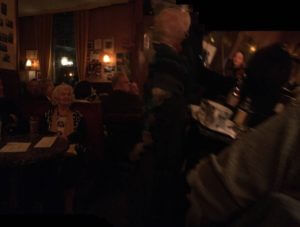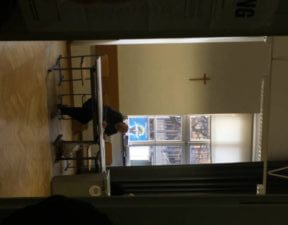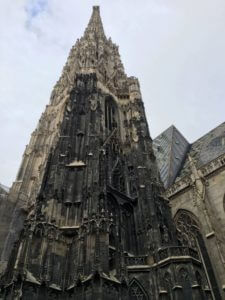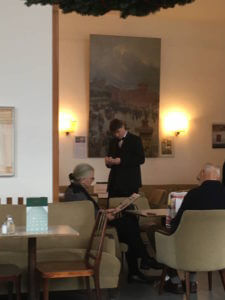Ricochet is the best place on the internet to discuss the issues of the day, either through commenting on posts or writing your own for our active and dynamic community in a fully moderated environment. In addition, the Ricochet Audio Network offers over 50 original podcasts with new episodes released every day.
 Postcards from Vienna
Postcards from Vienna
 Last Sunday, Norbert Hofer lost the Austrian presidential election to Alexander Van der Bellen. This was a re-run; the original vote was held in May, with Van der Bellen, an elderly former Green Party leader, defeating Hofer by little more than 30,000 votes. Hofer’s party — the Freedom Party — challenged the results of the May election on the grounds of procedural irregularities: The glue on the absentee ballots, they said, was defective. The Constitutional Court ruled in their favor and called for a repeat.
Last Sunday, Norbert Hofer lost the Austrian presidential election to Alexander Van der Bellen. This was a re-run; the original vote was held in May, with Van der Bellen, an elderly former Green Party leader, defeating Hofer by little more than 30,000 votes. Hofer’s party — the Freedom Party — challenged the results of the May election on the grounds of procedural irregularities: The glue on the absentee ballots, they said, was defective. The Constitutional Court ruled in their favor and called for a repeat.
Hofer is widely described as a far-right candidate, although I don’t think this term helps readers to understand what he represents. That said, I’m not sure that I can explain what he represents, even after a week of asking Austrian people what they thought he represented. I was surprised by the vagueness or the evasiveness of the response when I asked people, “So, what does Hofer stand for? What’s his ideology?”
Agnes Palmisano, a Viennese coloratura soprano who doesn’t care for Hofer, repurposed the Otto Reutter song for the election: Take the old one.
I asked her why the young one rubbed her the wrong way. She told me she wasn’t political by nature, and she usually avoided political arguments because she knew that “very frankly, I’m not informed.” But she instinctively found Hofer unwholesome. Her father was ethnically Slovenian, she said. She didn’t like the idea of predicating Austrian citizenship on German ethnicity. She was uneasy, too, about the way people wouldn’t say, forthrightly, that they planned vote for Hofer, even though they obviously meant to do it. The unwillingness to debate his ideas openly seemed unhealthy to her.
One of the most interesting people I met was Evgeni Dönmez, a Turkish-origin politician for the Green Party. He felt that people who voted for Hofer were responding to a very real problem — to the problem the culture many of the new arrivals brought with them, to Islamist authoritarianism — which his own party was unwilling to acknowledge. Hofer’s party, he said, was “asking the right questions.” But their answers were “absolutely the wrong ones.” This conversation was worthy of a post of its own; I’ll come back to this after I transcribe my notes from the meeting.

The polling station — a local high school.
…
In August of 2015, 71 refugees and migrants were found in the back of a truck on Austria’s A4 road. They had suffocated to death while being smuggled into central Europe.
A few days later, hundreds of refugees began walking from Budapest to Vienna. They were initially met with a wave of support. Austrian authorities begin ferrying refugees from the Hungarian border to Vienna, and then onto Germany via Salzburg. Some 170,000 refugees and migrants passed through Austria like this. The international media favorably contrasted Austria’s police and politicians with Hungarian authorities. Thousands of Austrians donated, volunteered to help the new arrivals, attended rallies in support of the refugees.
Not everyone in Austria was moved by this, however. Fear about immigration led to a surge in support for the Freedom Party, which immediately gained 15 percentage points in Upper Austria elections in September, then took 31 percent of the vote in Vienna elections in October.
On October 17, 2015, Hungary closed its border with Serbia and Croatia. By the end of 2015, thousands of migrants and refugees were trapped at Austria’s Slovenian border. Austria’s conservative Interior Minister, Johanna Mikl-Leitner, announced that Austria would build a fence to help control the flow. In the beginning of 2016, Austria built a barrier at the Brenner border with Italy. In March 2016, Macedonia, Croatia, and Slovenia shut their borders, with Austria’s encouragement. After the closure of that route and the strengthening of controls at Austria’s Italian border, refugees and migrants largely stopped trying to transit the country.
Austria accepted nearly 90,000 asylum applications in 2015 — one of the highest per capita numbers in Europe. But the government decided it couldn’t allow this to happen again, and announced a new annual upper limit on asylum applications of 37,500. The Austrian parliament adopted one of Europe’s toughest asylum laws. The bill permits the government to declare a state of emergency if migrant numbers suddenly rise and to reject most asylum-seekers directly at the border.
One year after the initial influx, Austria introduced one of Europe’s strictest asylum laws. Controls on the Italian border were strengthened. The Balkan route was cut off.
***
What most surprised me is that I expected to be able to see the effect this wave of migration had on the city. I’m not sure why I expected this, because rationally, 90,000 people wouldn’t be that visible in a city of 2.6 million. But the election I had come to see was represented, in the Anglophone media, as a contest between a left-wing candidate and an anti-immigrant populist. Why would an anti-immigrant populist gain purchase in Austria unless there was, visibly, a significant immigrant presence?
You might suspect that I had my globalist, rootless cosmopolitan blinders on, so I took as many photos and videos as I could. This is the city center, although most of the city looks like this, ethnically speaking:
I asked Lillibellt and her husband to take me to the neighborhoods people worried about. Here’s a so-called Turkish neighborhood:
Vienna is consistently ranked the world’s most prosperous and best-run city, and that prosperity is obvious. Well-made cars purr sleekly along wide roads free of traffic. On weekend mornings, the Viennese practice their equestrian skills and walk their greyhounds and Weimaraners in the woods. There are no bad neighborhoods; at least, none that I saw. Vienna is extremely wealthy compared to Paris. It’s extremely wealthy compared to Seattle, for that matter. It’s still the cradle of Alpine skiing, topped-rank in Mercer’s personal safety index based upon internal stability, crime, effectiveness of law enforcement.
Even Vienna’s public housing projects, in the center of the city, are luxurious and immaculately maintained. It’s true that they’re spooky to walk through at night, but only because the streets were so absolutely silent and empty.

High gothic architecture is glorious, if spooky. St. Stephen’s Cathedral.
And everything in Vienna looks a bit spooky to me, because it’s the dead of winter, and there’s something about Central Europe — Gothic architecture, in particular — that suggests ghosts, hauntedness, a permanent Halloween.
It would be epic arrogance to claim that after six days in Vienna, I fully understand the situation — particularly because I don’t speak German. My impression, though, was that Vienna looked barely affected by the refugee crisis.
Perhaps what caused people to feel overwhelmed was the fall of 2015, when, everyone agrees, the authorities lost control. When Merkel she said there would be “no limit” to the number of refugees Germany would accept, it caused people to think that literally millions of people would soon show up in Austria. I took her statement to mean (as I still think she probably intended), that Germany would set a good example and accept a generous number of refugees, this in the expectation that other countries would do the same. But it was understood as a genuinely insane statement, one that literally meant, “We will accept as many needy people as there are in the world, perhaps billions.” The failure to discuss the situation forthrightly gave the impression that the authorities generally, and Merkel particularly, had taken leave of their minds.
I wonder if the sense of crisis could have been forestalled had the Austrian Chancellor said from the first, “We’ve studied our budget and come up with a c oncrete number of refugees we can accept, feed, house, and educate until their country is safe or until they enter the workforce. That number is four-tenths of a percent of our population per annum. We will pay for this by making these specific cuts to our budget, and raising taxes by this amount. People who wish privately to sponsor more refugees are welcome to do so, so long as the refugees in question pass security and background checks, for which you as the sponsor must pay. Asylum applications must be processed at the border to ensure that no one enters the country on an illegitimate claim. Here is the plan. It is a specific plan.” It was the vagueness of the official response, I suspect, that made people lose their minds.
oncrete number of refugees we can accept, feed, house, and educate until their country is safe or until they enter the workforce. That number is four-tenths of a percent of our population per annum. We will pay for this by making these specific cuts to our budget, and raising taxes by this amount. People who wish privately to sponsor more refugees are welcome to do so, so long as the refugees in question pass security and background checks, for which you as the sponsor must pay. Asylum applications must be processed at the border to ensure that no one enters the country on an illegitimate claim. Here is the plan. It is a specific plan.” It was the vagueness of the official response, I suspect, that made people lose their minds.
 There are no hordes; Austria has not been overrun.
There are no hordes; Austria has not been overrun.
It’s true that if the borders had stayed open, and if everyone who wanted to come to the West had shown up in Austria, Austria would, indeed, have been inundated and unable to cope. That week, or ten days, extrapolated over a year, say, would be the nightmare people believe they can already see. But it didn’t happen, and it won’t.
It looked manageable to me. But if people think there’s no way to discuss immigration forthrightly, perhaps it doesn’t look manageable.
On the other hand, if a politician is telling you there’s a huge problem, but you can’t see it — why would you trust him, either? I was surprised that Norbert Hofer was defeated by such a big margin, but perhaps I shouldn’t have been.
Published in General



I had only good experiences — the Viennese people I met were nothing but warm, gracious, and welcoming to me, and Lillibellt and her husband and their friends just couldn’t have been more kind and more willing to share their time and thoughts. Efficient, yes: absolutely everything worked. Whenever I called a cab they said, “It will be here in three minutes,” and three minutes later, there it was.
I think a lot of Americans knew what Trump stood for. There was very little doubt on the part of his supporters. I began as very skeptical but voted for him and am pleased at what has happened. His principle attraction, in my opinion, was absolute rejection of the Social Justice Warrior culture that had been gaining for 8 years.
Your experience is coloring your appraisal.
I attended university in a part of San Antonio where homes and businesses are palatial compared to inner city apartments, where garbage in the streets and graffiti were not particularly common. The people I met there were not coarse or uneducated. The area was poor compared to Houston suburbs, but it was equal to many mid-sized cities and smaller towns I’ve known.
I was there for months before learning that the school campus was uniquely free of crime (because of its copious religious reminders). Surrounding neighborhoods were dominated by competing gangs, which frequently killed each other as they robbed, raped, and extorted local businesses… sometimes in connection with Mexico’s own gangs.
There are certainly places where social decay is easily discerned. But not all places are so.
That’s more or less how it happened in Canada (minus the part of keeping the budget balanced). It’s easier of course with the Atlantic Ocean in between. And almost an order of magnitude less than 0.4%.
Overland. From. Afghanistan.
Incredible
That’s interesting, did the people you spoke with seem to want to stay in Europe? The refugees I got to know in my language course in Berlin were pretty uniform in wanting to go back to Syria after the war ends.
What you said about Merkel’s lacking a well articulated plan is absolutely right. She allowed the AfD to fill in the gaps for her and totally lost control of the message. Even so, the images on the news last year of everyone streaming in would naturally have worried anyone.
What do you think the greatest obstacles are for the refugees in Austria then?
So how about the burka ban proposal Frau Merkel made to the CDU meeting?
Obviously the polls are telling her something. Maybe Claire can take her camera to Frankfurt and get the reaction there.
It’s so transparently desperate. It would affect maybe 300-400 people. I think it would make a great deal more sense for her to make statements that are rooted in good policy while still appealing to common sense, maybe that Germany welcomes every legitimate refugee who is here to work hard and play by the rules. However if any third country national is convicted of a serious or violent crime they will be deported and subject to a minimum five year ban on future immigration or asylum applications. I don’t know what the law is presently, but I’m sure she could promise to tweak it to her advantage. That might be a start.
It also seems dishonest to me, but not entirely. So also with her previous statements that might please conservatives. I think there may be something there, a kind of flipside to the public face she has put on for Germany & which the electorate has consistently rewarded. In Germany, as opposed to say France, I suspect the politics really mirrors problems in the society…
Glad you enjoyed your visit. Vienna is one of my favorite cities.
Two observations :
Wealth
Vienna certainly exudes prosperity. But how do you evaluate a city’s wealth. Most ‘league tables’ use a city’s GDP. But Vienna’s principal output is music, which is by definition priceless.
UN-Habitat ranked Vienna the most prosperous city in the world in 2013, but I do not know what criteria were used.
[Just for information, Forbes Magazine published an article in March 2016 ranking the world’s cities by the number of billionaires : NYC came first, with London (5th), Paris (12th) and Geneva (25th) the only European cities in the top 25.]
Atmosphere
I well remember that, on my first visit to Vienna, more than 30 years ago, I found it rather depressing, an aged Habsburg lady in an elegant, but outdated decor, immobilized as if caught in an historical time-warp. (It improves on closer acquaintance).
In a sense, it epitomizes European culture, and your comments come as a timely reminder that it has twice (1529 and 1683) withstood Moslem invaders.
Thanks for your as always enriching insights.
See this as to why Islam’s followers don’t assimilate:
That’s exactly what I thought, I wouldn’t be comfortable speaking to a reporter about my support for Trump; because I know I would be painted as a racist. I can see the chyron: “local racist”.
That was before Liberalism was corrupted by Leftism though.
Claire,
Just curious what your reaction is to this story from back in May this year.
Migrant Rape Epidemic Reaches Austria
…
Regards,
Jim
I have a different understanding of microaggression then.
Is it rude to be in a classroom in which all of the students are white when a non-white student walks in? That has been offered as an example of microaggression.
Hofers defeat make sense if you follow the ‘news’ over there ( well, really,meaning if you follow or are aware of its selectivity and lack of diversity in issue coverage) or travel there, have friends there ,( pay attention Claire>>) who aren’t ideologues.
Imho, we here in the US ( the rubes) just shook off our complacency in larger numbers before they did yielding victory.
The ‘Best’ part (and governing factions) of Austrian ‘Society’, their media et al practiced(s) an Austrian form of gleichshalutung(sp?), in short- they use the usual EU tools to suppress organizations, thoughts, etc. outside their EU ‘we are the world’ agitprop etc., ignore anything that doesn’t compliment that view, example; the OFR (Austrian Broadcasting Corporation) basically practiced a blackout of broadcasting anything ( and there were Plenty of incidents native and Continent wide) that would paint refugees etc. in a bad light, even if it were a simple, absolutely NON judgemental recitation of fact(s), very often, not even covering ANY refugee issues good bad or indifferent as if [they] didn’t even exit at all.
Additionally, according to my friends there,on both sides of the ‘issue’ Hofer was a flawed candidate too, then again, so is Trump ;)
Thats why ‘they couldn’t see it’ Claire….they weren’t intended or allowed too.
Watch The Third Man if you’ve never seen it. I’ve only been to Vienna once — in August — and it was spooky then. Once was enough. Have been to other parts of Austria lots of times, but have never cared for Vienna.
Claire Berlinski, Ed.: being aware that individuals are not defined by their culture,
Huh? Individuals AREN’T defined by their culture? Are you kidding? There can be certain things they don’t buy into, but they are defined by it even when they are rebelling or rejecting it.
Are you sure you aren’t being Potemkin villaged?
http://www.foxnews.com/world/2016/11/17/pure-hatred-translator-reveals-how-muslim-refugees-want-to-islamize-germany.html
And will remind you that the Saudis will move in with their OIC position that assimilation is racism and a crime against humanity meme.
It’s only like half their supporters which are a basket of deplorables. No worries ;-)
This is anecdotal, but an amazing number of the kids of Mexicans who come to my hospital have “American” names. There are lots of Juans and Joses but a lot of Brians, Jeffersons, and Madisons, too.
But that’s first names. Are the last names Americanized? Did you ever see a Muslim American his Mohammed to something else?
I wish I could agree with your sunny optimism. I would argue that Judeo-Christian identifies something that existed well before the term was invented, see George Washington’s letter to the Newport synagogue, for example. I am much less hopeful that Islam will ever agree to such an ecumenical concept. Even if the economic migrants you interviewed want to assimilate, I think the second generation frequently comes to a different conclusion.
Look at this short two minute video for a different perspective:
https://www.youtube.com/watch?v=sEeXd9b01uY
It is absolutely astounding. The worst part, one told me, was the Iranian border; the Iranians, he said, were “mad dogs.” I’m wondering whether they’ll be sent back under the terms of this deal.
I grew up in New Mexico, so to me “Garcia” is as an American name as you can get. I have not seen as many Muslims with American-born kids, but some have had “American” first names. As to the earlier generations changing their surnames, a lot of that was involuntary.
How were they involuntary? Was there a law passed to force them? I live in NYC and I come across quite a few Muslims. I have never seen one, adult or child, with an American first name. None.